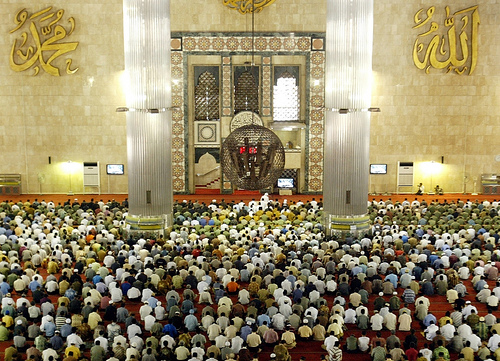
While not officially an Islamic state, Indonesia has the world’s largest Muslim population. In Indonesia, 87.54% of the population, 205,000,000 people, is Muslim. This is 12.7% of the world’s 1.62 billion Muslims. Non-Muslim religious believers in Indonesia are Protestant (6.96%), Catholic (2.91%), Hindu (1.69%), Buddhist (0.71%), Confucian (0.05%), and others (0.13%). The majority of Indonesia’s diverse religious communities operate openly and with few governmental restrictions, although there are only six officially recognized religious groups – Islam, Protestantism, Catholicism, Hinduism, Buddhism, and Confucianism.
Indonesia is a member of the Organization of the Islamic Conference (OIC). Most of Indonesia’s Muslims are Sunni. The two largest Muslim Sunni social organizations combined claim around 70 million followers: Muhammadiyah claims 40 million Sunni followers, and Nahdlatul Ulama claims 30 million Sunni followers. An estimated one million to three million Shi’a Muslims live in Indonesia. Finally, Indonesia has many smaller Muslim organizations, including approximately 200,000-400,000 persons who subscribe to the heterodox Ahmadiyya Qadiyani interpretation of Islam.
Indonesia’s Ministry of Religious Affairs estimates the other populations to include approximately 16 million Protestants, 6 million Catholics, 4 million Hindus, 1 million Buddhists, 115 thousand Confucians and 296 thousand “others.”
Religious groups that are indigenous, traditional, or otherwise not one of the six officially recognized religions should be reported to the Ministry of Education and Culture at the provincial or regional level.
Generally, in most areas, human rights are respected in Indonesia. Free expression, worship and assembly are generally upheld. Violations of these freedoms are now documented, publicized and brought to the human rights office. Citizens are also able to petition the government on significant violations of human rights.
Consitutional Provisions and Ordinances on Religion
The Constitution of Indonesia (Undang – Undang Dasar Republik Indonesia 1945) provides for freedom of religious belief and is the guiding source of law for statutes and other regulations. The guiding standard of the Constitution of Indonesia is the Pancasila or “five principles.” These include Belief in the One and Only God; Just and Civilized Humanity; the Unity of Indonesia; Democracy Guided by the Inner Wisdom in the unanimity Arising Out of Deliberations among Representatives; and Social Justice for the Whole of the People of Indonesia. Although the Constitution of Indonesia is based on “belief in the One and Only God,” and the “State [is] based upon belief of the One and Only God,” the Constitution of Indonesia also explicitly provides for freedom of religion, “guarantee[ing] all persons the right to worship according to their own religion or belief.”
These statements within the Constitution of Indonesia place religion, among a handful of other ideals, at the forefront of state ideology in Indonesia.
For more information please see the links below.